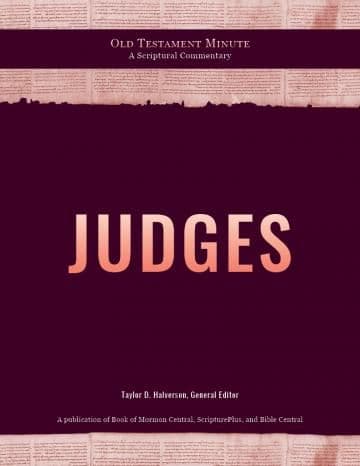Book
12 Chapters

Continuing the depiction of Samson as an angry hothead in the previous chapter (see Judges 14:19), Judges 15 demonstrates Samson’s physical prowess by his exploits against the Philistines. Samson’s first undertaking was to tie torches or firebrands onto the tails of foxes and let the foxes loose in the Philistine grain fields (15:1–8). This act, however, resulted in the death of Samson’s wife and her father by the hand of Philistines (verse 6), reinforcing the sad truth that violence begets violence. Indeed, this is precisely how Samson himself responded, unleashing a “great slaughter” upon the Philistines in retaliation (verse 8).
After this fiery experience, Samson had another encounter with hostile Philistines at the site of Lehi (verses 9–17). The name Lehi in Hebrew means “cheek, jawbone.”[1] This meaning plays on the details of the narrative, as it is here that Samson famously slew a thousand Philistines with the jawbone of an ass (verses 15–16). It could be that the author of Judges deliberately gave the site the name Lehi to fit his narrative portrayal of Samson. Alternatively, we might consider that the name derived from Samson’s victory over the Philistines, the details of which the author skillfully wove into his narrative. In any case, Samson’s fantastic strength was specifically credited to the power of the Spirit of the Lord coming upon him (verse 14).
The final account preserved in chapter 15 is of how God miraculously provided Samson with water when he was on the verge of dying from thirst (verses 18–20). As with the name Lehi earlier, the name Samson gave to the site, Enhakkore, plays off the description provided in the narrative: “And he was sore athirst, and called [qara‘] on the Lord, . . . wherefore he called the name thereof Enhakkore [‘en haqqore‘, ‘Spring of Calling’], which is in Lehi unto this day” (verses 18–19).
[1] Latter-day Saint readers of the Bible naturally wonder whether the name of the prophet Lehi from the Book of Mormon may be related to this Hebrew word. It certainly appears reasonable to assume so, but there are other possible origins for the name. See Jeffrey R. Chadwick, “The Names Lehi and Sariah—Language and Meaning,” Journal of Book of Mormon Studies 9, no. 1 (2000): 32–34, 77; Book of Mormon Onomasticon, s.v. “Lehi,” last modified November 11, 2017, https://onoma.lib.byu.edu/index.php/LEHI.
Book
12 Chapters
Items in the BMC Archive are made publicly available for non-commercial, private use. Inclusion within the BMC Archive does not imply endorsement. Items do not represent the official views of The Church of Jesus Christ of Latter-day Saints or of Book of Mormon Central.
How would you evaluate this content?